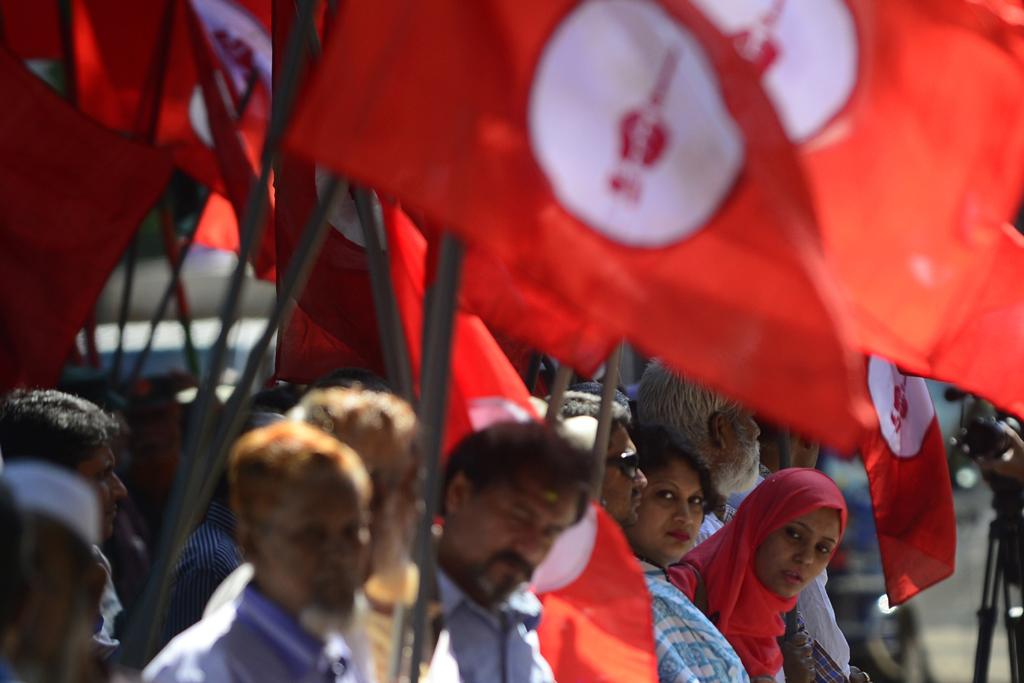Bangladesh war crimes panel sentences Islamist party leader Motiur Rahman Nizami to death
Bangladeshi social activists wait to hear news of the sentencing of Jamaat-e-Islami party leader Motiur Rahman Nizami outside a special court in Dhaka on Oct. 29, 2014.
Bangladesh's war crimes tribunal sentenced the chief of the Islamist Jamaat-e-Islami party to death on Wednesday for crimes against humanity, including genocide, torture and rape, during the 1971 war of independence from Pakistan.
The sentence passed on Motiur Rahman Nizami, a 71-year-old former legislator and minister, provoked protests, some violent, by supporters of his party who say the government has used the tribunal to weaken its political opponents.
"Considering the gravity of the crimes, the tribunal punished him with the death sentence," state prosecutor Mohammad Ali told reporters.
Nizami had already been handed down the death penalty in an arms smuggling case in January.
Jamaat-e-Islami said in a statement that the people of Bangladesh were "surprised, stunned and deeply sad" at Wednesday's sentence and called for a 24-hour general strike from Thursday and a 48-hour national stoppage from Sunday.
Police said Jamaat activists protested soon after the ruling and about 90 of them were detained in Nizami's home district.
Police also fired rubber bullets and tear gas to disperse activists of Jamaat and Shibir, the student wing of the party, in northeastern Sylhet, 174 miles from the capital, Dhaka.
They vandalized around 20 vehicles and more than a dozen people were wounded in clashes with police.
"We had to fire rubber bullets and tear gas to control the situation," said Mohammad Rahmat Ullah, additional deputy commissioner of Sylhet Metropolitan Police.
Additional police and paramilitary forces have been deployed across the country.
Law Minister Anisul Haque said that the government would carry out the sentence as quickly as possible.
"We are satisfied with the verdict and with this verdict justice has been established," the minister said.
Defense lawyer Tajul Islam told reporters his client would appeal to the Supreme Court.
"We are very unhappy with the judgment," he said.
Prime Minister Sheikh Hasina set up the tribunal in 2010 to investigate abuses during the independence war that claimed about three million lives and during which thousands of women were raped.
Critics say the government has abused the process as a political tool to target the two biggest opposition parties, the Bangladesh Nationalist Party and Jamaat-e-Islami. This year, more than 100 people have been killed in protests over the tribunal's verdicts.
The New York-based Human Rights Watch group has said the court's procedures fall short of international standards.
This was the first verdict of the war crimes tribunal since the government came to power after the Jan 5 election and was the tenth in all.
(Reporting By Serajul Quadir; Editing by John Chalmers and Nick Macfie)
Every day, reporters and producers at The World are hard at work bringing you human-centered news from across the globe. But we can’t do it without you. We need your support to ensure we can continue this work for another year.
Make a gift today, and you’ll help us unlock a matching gift of $67,000!
